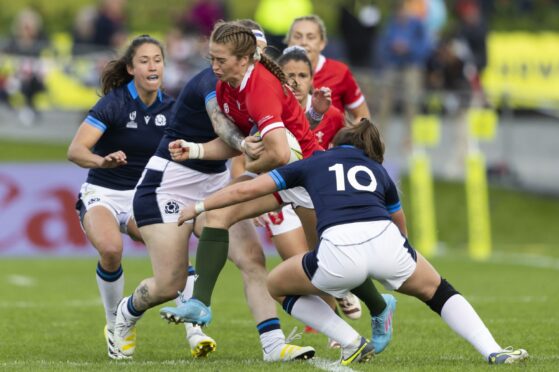Scotland’s excruciating 18-15 loss to Wales in their opening pool match of the World Cup is galling enough even without being so naggingly familiar.
It’s not the first time in 2022 that the Scots have almost completely owned possession and territory, while forcing a lop-sided penalty count on their opponents. In fact it’s the fifth time. They’ve lost all five games to late scores.
The most painful of all
Late drama as Wales take on Scotland at the World Cup https://t.co/xlSn3Pz1Qa pic.twitter.com/7hUUwIykox
— Rugby World (@Rugbyworldmag) October 9, 2022
For it to happen on their long-awaited return to the World Cup makes this the most painful of all. A penalty deep into injury time from Keira Bevan was the hammer blow this time, after Scotland had wrestled back from 15-5 down to tie the game.
Wales deserve great credit for riding out two yellow cards and for their defence. They missed only a third of the tackles the Scots did.
And you could convincingly argue that it was only Lisa Thomson’s heroic, try-saving tackle on Alisha Butchers just after the first yellow card that prevented the Welsh from icing the win 20 minutes before Bevan’s match-winning kick.
But the story of 2022 for the Scots – outside the overmatched losses to England and France – has been a failure to turn pressure into points.
Helen Nelson missed six kicks worth 12 points in Whangerei, but it’s not so much that. Tries are the primary currency in the women’s game. And against a set defence, 15 on 15, it seems Scotland simply can’t punch it in from close range unless it’s a lineout drive.
Both Megan Gaffney’s tries came when Wales were shorthanded, and both times they really laboured to get the ball to her in the extra space.
Scots too one-dimensional
A heart-racing finish creates celebrations for @WelshRugbyUnion after beating a competitive Scotland side in the final play#WALvSCO | #RWC2021 pic.twitter.com/dMBamu0ksv
— Rugby World Cup (@rugbyworldcup) October 9, 2022
Chloe Rollie got the ball in her hands going forward four, maybe five times. One of those was when she had to run out from her own line. Rhona Lloyd barely saw the ball, Gaffney got it maybe twice and scored on both occasions.
There’s pace out there but the Scots are very one-dimensional. Contrast that with Wales, who were inventive and incisive moving the ball behind their pack.
Upfront they didn’t have the power of the Scots but they just about held their own, and they were far better with ball in hand in space.
The stat from the game that really leaps out at you – other than the penalty count – is the Welsh made seven line breaks. The Scots made zero.
Scotland now go on to face Australia and New Zealand. Against the Black Ferns they’ll surely be overmatched, while the Australians will look to run them off the park.
There’s maybe not that much to be gained by a change of approach in these two matches. But by next year’s Six Nations, one hopes the Scots would try to develop a more balanced game.
